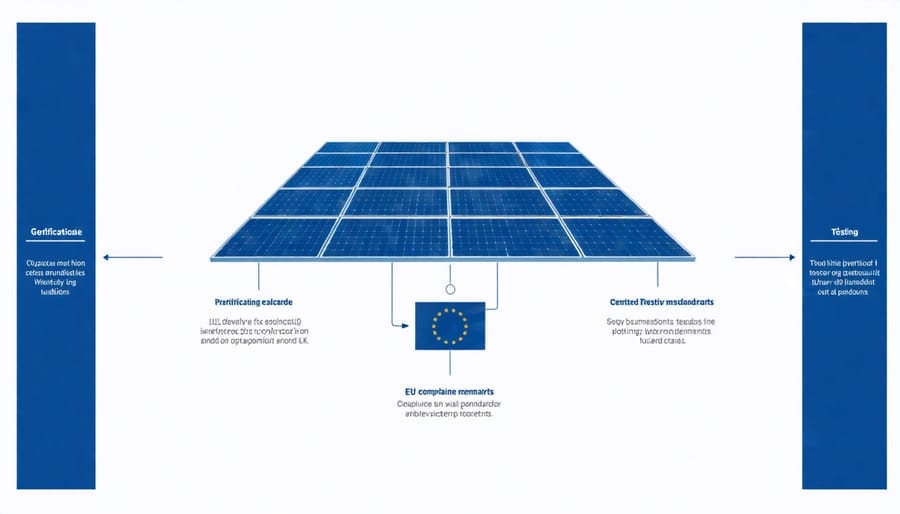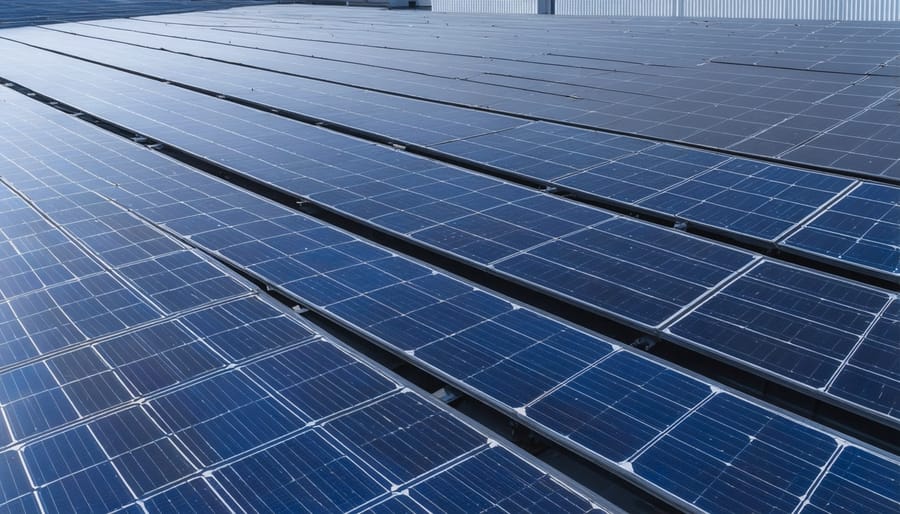How the European Energy Commission Shapes Solar Power’s Future

The European Energy Commission stands at the forefront of shaping the continent’s sustainable energy future, orchestrating a transformative shift in how 450 million Europeans power their lives and businesses. As the driving force behind the European Green Deal and the ambitious REPowerEU initiative, the Commission wields significant influence in accelerating Europe’s transition to renewable energy sources while ensuring energy security and affordability. Through strategic policy-making, substantial investment frameworks, and innovative regulatory measures, it has established itself as a global leader in clean energy governance, directly impacting everything from household solar installations to large-scale industrial energy projects. With unprecedented challenges in energy security and climate change mitigation, the Commission’s role has never been more critical in steering Europe toward its 2030 renewable energy targets and ultimate climate neutrality by 2050.
The European Energy Commission’s Core Functions
Policy Development and Implementation
The European Energy Commission follows a structured approach to developing and implementing comprehensive energy policies across member states. Through extensive consultation with stakeholders, industry experts, and public bodies, the commission crafts policies that address current challenges while anticipating future needs. Recent energy policy developments demonstrate a clear shift towards renewable energy integration and sustainable practices.
Implementation occurs through a three-phase process: policy drafting, member state consultation, and coordinated execution. The commission provides detailed guidelines, technical standards, and compliance frameworks to ensure uniform adoption across the EU. Regular monitoring and evaluation mechanisms help track progress and identify areas requiring adjustment, while enforcement measures ensure member states meet their commitments under various energy directives.
The commission also maintains flexibility in its approach, allowing for regional adaptations while preserving core policy objectives. This balanced strategy helps achieve broader energy goals while accommodating specific national circumstances and capabilities.

Market Oversight and Consumer Protection
The European Energy Commission plays a pivotal role in safeguarding consumer interests within the energy market. Through rigorous monitoring and enforcement mechanisms, the commission ensures transparency in pricing, billing practices, and service quality across member states. It actively works to prevent market manipulation and unfair trading practices while promoting healthy competition among energy providers.
A key focus area is the protection of vulnerable consumers, including measures to prevent energy poverty and ensure access to essential services. The commission implements strict guidelines for clear consumer information, including standardized energy labels and transparent billing requirements. This helps consumers make informed decisions about their energy consumption and suppliers.
The commission also maintains oversight of cross-border energy trading, ensuring that interconnected European energy markets operate fairly and efficiently. Regular market assessments and consumer satisfaction surveys inform policy adjustments, while a dedicated complaint handling system addresses consumer grievances promptly and effectively.
Solar Energy Compliance Framework
Technical Standards for Solar Equipment
The European Energy Commission maintains rigorous technical standards for solar equipment to ensure safety, reliability, and optimal performance across the EU. Understanding these solar regulations in Europe is crucial for successful implementation of solar energy systems.
All solar panels must comply with EN 61215 for crystalline silicon modules or EN 61646 for thin-film modules, which establish minimum requirements for design qualification and type approval. These standards ensure panels can withstand environmental conditions while maintaining performance levels. Additionally, IEC 61730 certification is mandatory for safety qualification, covering electrical and mechanical safety aspects.
Inverters must meet the EN 50549 standard, specifically addressing requirements for generating plants connected to distribution networks. The equipment must also comply with electromagnetic compatibility standards (EN 61000) and demonstrate grid support capabilities as outlined in VDE-AR-N 4105.
Key technical specifications include:
– Minimum module efficiency of 15%
– Maximum system voltage of 1000V DC for residential installations
– Power tolerance of -0/+5W
– Temperature coefficient below -0.45%/°C
– IEC 61215 testing for 1000V system voltage
– IP65 rating minimum for outdoor components
Manufacturers must obtain CE marking and provide Declaration of Performance (DoP) documentation, confirming compliance with all relevant EU directives and standards. Regular testing and certification updates ensure continued adherence to evolving technical requirements.

Installation and Safety Requirements
The European Energy Commission has established rigorous compliance requirements for solar installations to ensure safety, efficiency, and reliability across member states. These requirements encompass structural integrity, electrical safety standards, and environmental impact considerations.
Key installation requirements include proper mounting systems that can withstand local weather conditions, appropriate electrical grounding, and integration with existing power infrastructure. Installers must be certified according to EU standards and follow specific protocols for both residential and commercial installations.
Safety measures mandate the use of certified components, implementation of surge protection devices, and installation of emergency shutdown systems. All installations must comply with the Low Voltage Directive (LVD) and Electromagnetic Compatibility (EMC) regulations to ensure safe operation and grid stability.
Homeowners and businesses must obtain necessary permits before installation begins, including local building permits and grid connection approvals. Regular maintenance inspections are required to maintain certification and ensure optimal performance. Documentation of all safety measures and compliance checks must be maintained throughout the system’s lifecycle.
Environmental considerations include proper disposal protocols for end-of-life components and adherence to the WEEE Directive for electronic waste management. The Commission also requires impact assessments for large-scale installations to protect local ecosystems and minimize visual impact on surrounding areas.
Impact on Solar Industry Stakeholders

Manufacturers and Suppliers
Equipment manufacturers and suppliers operating within the European Union must adhere to strict compliance requirements set by the European Energy Commission. These requirements encompass energy efficiency standards, product safety regulations, and environmental sustainability criteria. Manufacturers must obtain CE marking for their products, demonstrating conformity with all applicable EU directives and regulations.
The Commission requires detailed technical documentation, including energy performance certificates and test reports, before products can enter the European market. Suppliers must ensure their products meet minimum energy performance standards (MEPS) and provide accurate energy labeling that helps consumers make informed decisions.
Regular audits and conformity assessments are mandatory, with manufacturers required to maintain up-to-date documentation of compliance. The Commission also emphasizes eco-design requirements, pushing manufacturers to develop more energy-efficient and environmentally sustainable products.
For renewable energy equipment, additional certifications may be required, particularly for solar panels, inverters, and energy storage systems. Manufacturers must also provide clear installation guidelines and maintenance documentation to ensure optimal performance and safety throughout the product lifecycle.
Non-compliance can result in significant penalties, including product recalls and market restrictions, making it essential for manufacturers to stay current with evolving regulations and standards.
Installers and Service Providers
Installers and service providers operating within the European Union must meet stringent requirements established by the European Energy Commission to ensure high-quality solar installations and consumer protection. These professionals must obtain certification through recognized training programs that cover technical competencies, safety protocols, and regulatory compliance.
Key operational requirements include demonstrated expertise in system design, installation techniques, and maintenance procedures. Certified installers must stay current with evolving technologies and regulations through regular training updates and assessments. The Commission mandates comprehensive documentation of installations, including detailed site surveys, system specifications, and performance guarantees.
Service providers must maintain proper insurance coverage and provide clear warranties for their work. They are required to follow standardized best practices for customer communication, project management, and after-sales support. The certification process also emphasizes knowledge of grid connection requirements, local building codes, and environmental impact considerations.
Companies must register with national authorities and maintain transparent records of their qualifications and project history. Regular audits ensure continued compliance with quality standards and safety regulations. This robust framework helps maintain high industry standards while fostering consumer confidence in solar energy solutions across the European market.
Future Regulatory Developments
The European Energy Commission is poised to introduce several significant regulatory changes that will shape the future of solar energy deployment across the EU. A key development is the anticipated expansion of the European Green Deal, which aims to accelerate solar adoption through streamlined permitting processes and enhanced financial incentives by 2025.
Notable upcoming regulations include the Solar Rooftop Initiative, which will mandate solar installations on new commercial buildings and renovations across member states. This measure is expected to boost solar capacity while creating thousands of green jobs throughout the EU.
The Commission is also developing new grid integration standards to address the challenges of increasing solar power penetration. These standards will focus on smart grid technologies and energy storage solutions, ensuring stable power supply as solar adoption grows.
Another significant development is the planned introduction of enhanced sustainability criteria for solar equipment manufacturing and recycling. These regulations will promote circular economy principles and reduce the environmental impact of solar installations.
Stakeholders should prepare for stricter energy efficiency requirements and updated technical standards for solar installations. The Commission is working on harmonized certification processes that will simplify cross-border solar projects while maintaining high-quality standards.
These regulatory developments demonstrate the EU’s commitment to achieving its renewable energy targets while fostering innovation and sustainable growth in the solar sector.
The European Energy Commission continues to play a pivotal role in shaping the continent’s sustainable energy future. Through comprehensive regulatory frameworks and innovative support mechanisms, the Commission has established itself as a driving force behind Europe’s energy transition. Stakeholders across the spectrum, from homeowners to large industrial operators, benefit from clear guidelines and incentives that promote solar energy adoption while ensuring system reliability and safety.
For businesses and industry professionals, understanding and complying with Commission directives is essential for successful project implementation. The established frameworks not only protect consumers but also create a stable environment for investment and growth in the solar energy sector. Homeowners can take advantage of various support schemes and technical assistance programs, making solar adoption more accessible and financially viable.
Looking ahead, the Commission’s commitment to renewable energy development promises continued support for solar initiatives. By maintaining close collaboration with member states and industry stakeholders, the Commission ensures that Europe remains at the forefront of sustainable energy innovation. This collaborative approach, combined with regular policy updates and technical guidance, provides a solid foundation for achieving Europe’s ambitious clean energy goals while supporting economic growth and energy independence.
Leave a Reply